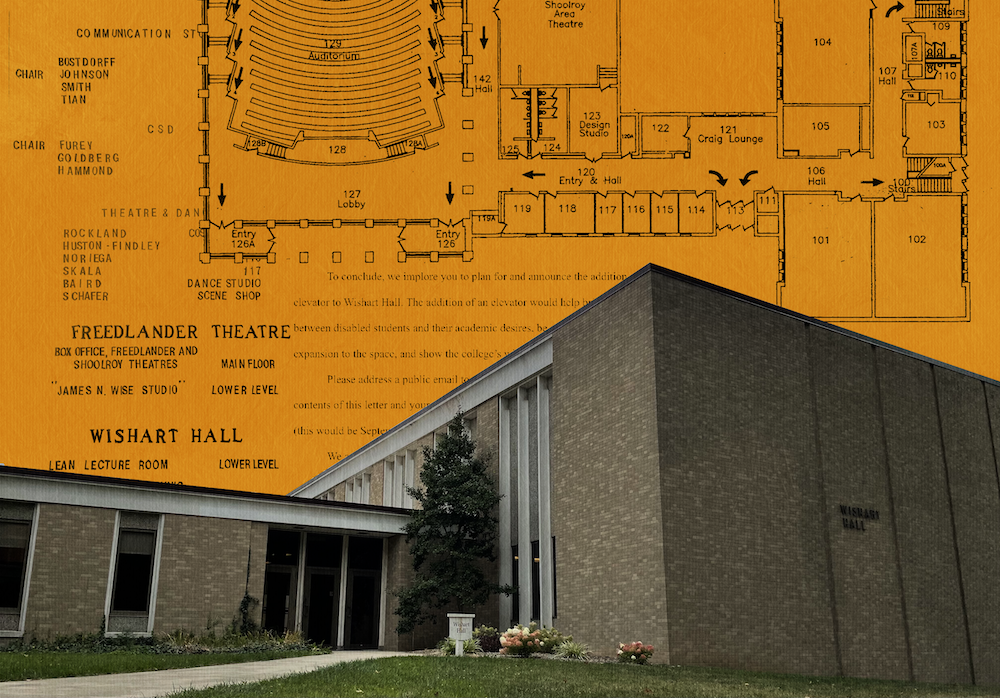
Julia Garrison
News Editor
Co Clark ’25 draped a banner on the barrier of the Lowry second floor overlooking Brush Lobby around noon Aug. 25, reading “Elevators are the bare minimum. Access can’t wait. Disability justice now.” Hung alongside the banner was the disability pride flag.
Clark’s banner came as no surprise, as the junior had been actively sharing an open letter addressed to President Anne McCall, Amber Larson and Carly Jones, the latter two administrators in the Academic Resource Center (ARC) requesting that the administration make an effort to “create concrete plans” for the addition of an elevator in Wishart Hall.
Built in 1966, Wishart houses the College’s communication studies, communication sciences & disorders (CSD) and theatre & dance departments, connecting to Freedlander Theatre and housing the only dance studio utilized for classes on campus on the second floor. The building is also home to the Freedlander Speech and Hearing Clinic in the basement, which is directly affiliated with the CSD department.
“Wishart itself is not an accessible building. Monthly campus faculty meetings are being held in the Governance Room of Scot Center this year, rather than Lean Lecture Hall, for that very reason,” said communications professor Denise Bostdorff, who explained that external reviewers of the building have been recommending an elevator for the space for nearly 30 years.
The open letter penned by Clark amassed almost 200 signatures from assorted faculty, staff, students and alumni. Clark delivered the letter both digitally and virtually to its addressors on Friday Aug. 28 preceding the draping of the banner. A part of the theater and dance department, Clark is not the first member of the dance community to inquire for the inclusion of an elevator in the building where he has most of his classes.
“The fact that we don’t have [an elevator]… is just something that we’ve dealt with, but it’s really not ideal. I can’t think of another space on campus where that would be allowed.” Emily Baird ’16, associate professor of dance, explains her relationship with the space. The dance studio being on the second floor has created issues for students and faculty alike.
“It’s really impactful for students who are disabled, for students who are injured,” she explains. “There have also been several incidents throughout my time here where a student will have something happen… where I have had to physically help them down the stairs because they need medical attention.”
Disability Advocacy and Support Alliance (DASA) president Eli Cantrell ’24 explained that the fact that this issue had not been addressed before by administrators was concerning, outlining that ADA requires that classrooms be relocated if a student has an accommodation.
“This approach makes it difficult for students to feel connected with their majors when these majors are all housed in a building that is not accessible,” Cantrell explains. DASA has become a central point of contact for disabled students across campus wishing to connect with other disabled students, as well as getting more involved with issues such as the accessibility issues across campus as the year progresses. “I’m thrilled to see disabled students on campus… using their voice to advocate for their needs. I hope that [the] administration takes the time to listen.”
Wishart is not the only area of concern for disability access across campus. Clark mentioned the lack of an elevator in Babcock, the home of the mutual aid pantry and the former home of the Center for Diversity and Inclusion.
Director of Facilities Budget and Project Administration, Beau Mastrine, shared that there are currently no plans for major renovations on buildings across campus, but that capital project requests would be approved and released in early spring.
“Our building issues will take time and significant investments to address,” said president McCall about the accessibility of Wishart. “In the coming weeks, we’ll have identified the first steps we can make, starting this year, to improve the student experience of our built environment.”
In a Sep. 5 meeting with Clark and other supporters of the open letter, president McCall made a verbal commitment to begin the process of making Wishart an accessible building.
“Until I graduate and after – if I am given the ability and blessing – I will be working to make sure that disabled people can come after me.” Clark explains. “That’s the dream.”
